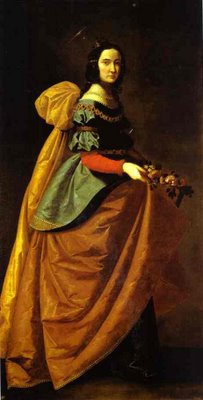On the Feast of another Monarch

Do not forget that when sovereigns are at war they can no longer busy themselves with their administration; justice is not distributed; no care is taken of the people; and this alone is your sovereign charge, this the main point of your duty as kings.
Born in 1271 to the royal family of Aragon, Elizabeth was married to Denis, King of Portugal, at the age of twelve. She bore him two children: Alfonso and Constance. She is chiefly remembered for her piety, loyalty, and her commitment to the work for peace. Throughout her life Elizabeth was attentive to the needs of pilgrims and the poor of Portugal; she was ardent in calls for redistribution of land.
Elizabeth was able to prevent war between Portugal and Castille at least four times by mediating with the kings. In 1320, Elizabeth's son, Alfonso, at 20 years of age, organized and led a revolution against his father's government. Torn between the love and loyalty of the two, Elizabeth sought to negotiate a truce; however, because her husband, King Denis, no longer trusted her motives, he banished her from the kingdom. Five years later, Denis fell ill. Despite many years of public infidelity and her exile, Elizabeth forgave her husband and nursed him daily throughout his final illness.
Following Denis' death, Elizabeth distributed her property to the poor and retired as a Franciscan tertiary to a monastery of the Poor Clares she had founded at Coimbra. In 1336, though weak with age and illness, she set out from the convent in the hopes of negotiating a lasting peace between her son Alfonso, now king of Portugal, and his son-in-law, the king of Castile. She succeeded in her mission, but the exertions and heat were too much for her ailing body and she died before she could return to the enclosure at Coimbra. Elizabeth was buried in Coimbra, where she had often humbly served the Poor Clares at table.
Elizabeth was able to prevent war between Portugal and Castille at least four times by mediating with the kings. In 1320, Elizabeth's son, Alfonso, at 20 years of age, organized and led a revolution against his father's government. Torn between the love and loyalty of the two, Elizabeth sought to negotiate a truce; however, because her husband, King Denis, no longer trusted her motives, he banished her from the kingdom. Five years later, Denis fell ill. Despite many years of public infidelity and her exile, Elizabeth forgave her husband and nursed him daily throughout his final illness.
Following Denis' death, Elizabeth distributed her property to the poor and retired as a Franciscan tertiary to a monastery of the Poor Clares she had founded at Coimbra. In 1336, though weak with age and illness, she set out from the convent in the hopes of negotiating a lasting peace between her son Alfonso, now king of Portugal, and his son-in-law, the king of Castile. She succeeded in her mission, but the exertions and heat were too much for her ailing body and she died before she could return to the enclosure at Coimbra. Elizabeth was buried in Coimbra, where she had often humbly served the Poor Clares at table.
The Collect:
Father of peace and love, you gave saint Elizabeth the gift of reconciling enemies.
By the help of her prayers, give us courage to work for justice and equity among nations, and so bring lasting peace to your sons and daughters.
We make our prayer through our Lord Jesus Christ, your Son, who lives and reigns with you, Father, and the Holy Spirit, one God, for ever and ever.
By the help of her prayers, give us courage to work for justice and equity among nations, and so bring lasting peace to your sons and daughters.
We make our prayer through our Lord Jesus Christ, your Son, who lives and reigns with you, Father, and the Holy Spirit, one God, for ever and ever.







<< Home